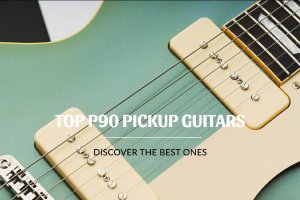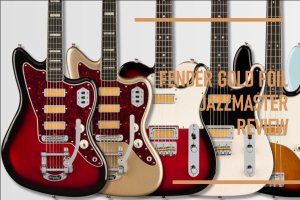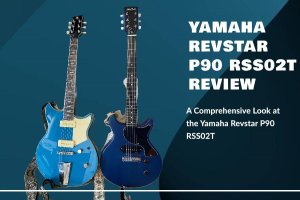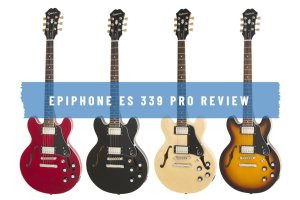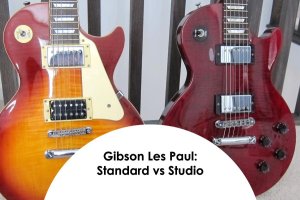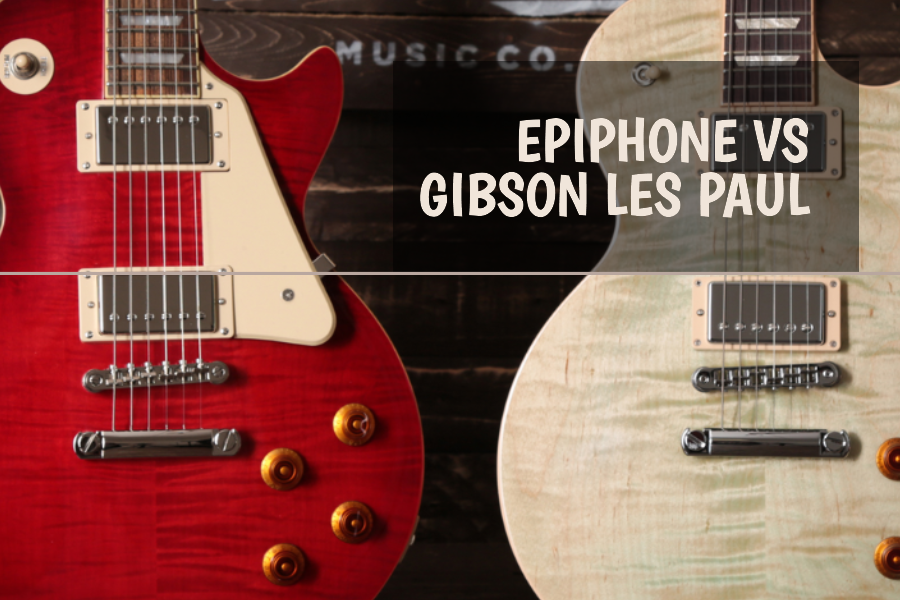
The Les Paul is the most iconic guitar shape in rock music history. Since its introduction in the early 1950s by the partnership of Gibson and legendary guitarist Les Paul, it has graced the hands of legendary players across genres. While the original Gibson Les Pauls are highly-coveted instruments, their more affordable counterparts from Epiphone offer a way for any budding guitarist to experience that classic Les Paul vibe.
In our blogpost today, we are going to explore both of the electric guitars inside out. We will clearly show the difference between the Epiphone and Gibson below:
EPIPHONE LES PAUL VS GIBSON LES PAUL: HISTORY
Epiphone and Gibson have connected history as iconic electric guitar brands. Epiphone was founded first in 1873, starting with mandolins and stringed instruments. Gibson followed in the late 1800s, also beginning with mandolins before moving to acoustic guitars.
By the 1930s, both had reputations for innovative semi-hollow electric guitars, beginning a heated competition. Gibson would release a innovative design, and Epiphone would introduce an even more cutting-edge model.

The legendary guitarist Les Paul developed his famous “Log” guitar prototype with Epiphone in the 1930s-40s. After that, Gibson used his design and name for their first solid body electric, the Les Paul, in the 1950s.
Financial troubles led Epiphone to be acquired by Gibson in the 1950s for just $20,000. Epiphone was kept as Gibson’s high-end electric brand in the US until the 1970s when production moved overseas.
Today, Epiphone guitars are positioned as more affordable versions of Gibson models, though some unique Epiphones are still made in the USA.Decades of guitar invention were spurred on by this competition between the two brands.
EPIPHONE LES PAUL VS GIBSON LES PAUL: Build Quality and Materials
When comparing the Epiphone Les Paul vs the Gibson Les Paul with build quality and materials. The key differences lie in the construction techniques, wood selection, and component details.
The binding of Gibson Les Pauls is hand-finished utilizing traditional methods such as binding rope in the form of mummification and specialist binding glue. . The body is made from high-grade solid mahogany with thick AA flame maple caps. Fretboards are premium rosewood or ebony with acrylic/mother-of-pearl inlays.

In contrast, Epiphone Les Pauls use more automation in their production to reduce costs. The bodies use similar mahogany but often with thinner maple veneers. Fretboards are typically laurel wood, though higher-end models have ebony. Inlays are pearloid instead of mother-of-pearl.
While Epiphone stays true to the Les Paul blueprint, Gibson’s meticulous construction and premium materials result in a higher caliber instrument, albeit at a higher price point. Epiphone provides excellent value with consistent quality for the budget-conscious player.
The choice comes down to prioritizing premium craftsmanship from Gibson or the affordability of Epiphone’s well-made Les Paul models.
EPIPHONE LES PAUL VS GIBSON LES PAUL: Aesthetics and Finishes
When it comes to aesthetics and finishes, Gibson Les Pauls have better looks and finishing over Epiphone models.
Gibson uses premium nitrocellulose lacquer finishes, like the iconic Cherry Sunburst. These finishes are pricey but age beautifully and allow the wood to resonate freely. The application is labor-intensive, involving a multi-day spraying and hand-rubbing process.
Epiphone opts for more affordable polyurethane finishes which are durable but don’t develop the same vintage vibe over time. The application is more efficient though still high-quality.
Gibson also pays careful attention to details like binding and abalone inlays, while Epiphone keeps things simpler with dot inlays.

While both companies guarantee a perfect finish buffing. We see that the Les Pauls made by Gibson have an unrivaled visual refinement because of their careful procedures and high-quality materials. At a more affordable price, Epiphone offers the traditional appearance.
EPIPHONE LES PAUL VS GIBSON LES PAUL: Pickups and Electronics
To compare the Epiphone and Gibson pickups and electronics. We see that Gibson Les Pauls take the lead with their premium 490R and 498T humbuckers, known for rich, articulate tones with excellent dynamics. Epiphone Les Pauls use more budget-friendly humbuckers that still capture the warm, punchy Les Paul character, but with slightly less nuance.
Gibson also uses higher-quality potentiometers, capacitors, and wiring which contribute to superior tone clarity and responsiveness. Epiphone’s electronics are more economical yet still perform well.

While Les Paul knockoffs from Epiphone are more affordable, the superior pickups and components used by Gibson guitars give them a tone that is expressive and nuanced—the kind of tone that will wow even the most picky guitarists. Prioritizing staying within budget or striving for the ultimate Les Paul tone is the deciding factor.
EPIPHONE LES PAUL VS GIBSON LES PAUL: Sound and Tone
When it comes to sound and tone, Gibson Les Pauls have a clear advantage with their premium BurstBucker pickups and resonant mahogany construction delivering unmatched harmonic richness, sustain, and responsiveness for that quintessential Les Paul voice.
Epiphone Les Pauls use mass-produced pickups like the Alnico Classic PRO and ProBucker that capture the warm, punchy Les Paul character well, but lack the nuance and articulation of Gibson’s offerings. Some higher-end Epiphones even feature authentic USA Gibson pickups.
While Epiphones provide great Les Paul tones on a budget, Gibson models offer an unrivaled experience for players seeking the pinnacle of sonic expression from this iconic guitar. The choice comes down to budget versus chasing authentic, premium Les Paul tone.
EPIPHONE LES PAUL VS GIBSON LES PAUL: Playability and Feel
To compare the playability and feel, both Epiphone and Gibson Les Pauls offer enjoyable playing experiences, but Gibson takes things to the next level with premium construction details.
Epiphone models feature comfortable slim taper necks and decent fretwork, along with lightweight bodies. However, Gibson Les Pauls have hand-rolled fretboard edges, precisely leveled frets, and a rounder, vintage-inspired neck profile that many prefer.

The most notable difference is the added heft and resonance from Gibson’s solid body construction, enhancing sustain and contributing to a more resonant, full-bodied tone.
While Epiphones deliver great playability for the price, Gibson’s superior craftsmanship provides a richer, more nuanced playing experience that purists are willing to pay more for. The choice comes down to budget versus elite feel and resonance.
EPIPHONE LES PAUL VS GIBSON LES PAUL: Value and Cost
Choosing between an Epiphone Les Paul and a Gibson Les Paul really comes down to how much you want to spend and what you’re looking for in a guitar.
Epiphone Les Pauls are more affordable, with prices ranging from about $500 to $800. They offer a great sound and look very similar to their Gibson counterparts. This makes them a solid choice for beginners or those on a budget who still want a quality guitar.
Gibson Les Pauls start at a higher price, around $2000, and can go much higher for special models. They’re made with more attention to detail and higher quality materials. For serious players or professionals, the extra cost can be worth it for the premium experience and sound.
In short, if you’re looking for value and a good entry into the Les Paul world, Epiphone is a great choice. If you’re after the top-notch quality and are willing to invest more, Gibson might be the way to go. The choice depends on your budget and what you value in a guitar.
EPIPHONE LES PAUL VS GIBSON LES PAUL: Suitable Applications and Players
For beginners, hobbyists, and musicians on a budget, an Epiphone Les Paul is the perfect entry point into this revered guitar shape. While more budget-friendly in construction, Epiphones offer tremendous bang for your buck and make great platforms for affordable upgrades like new pickups and hardware.
For working professionals and serious enthusiasts who demand premium tone and build quality, nothing beats an original Gibson Les Paul. Gibson’s nitro finishes, advanced pickup configurations, and premium woods give their Les Pauls a resonance and vibe that have made them the choice of guitar icons for over 60 years. Their wide customization options also allow players to truly make a Gibson their own.
Whether you go for the accessible quality of an Epiphone or the premium craftsmanship of a Gibson, joining the ranks of the countless legends who’ve wielded a Les Paul is a goal any rock or blues guitarist can aspire to.
EPIPHONE LES PAUL VS GIBSON LES PAUL: Customization and Upgrades
While a Gibson Les Paul looks and sounds perfect to many right out of the case, their multitude of premium options like nitro finishes and pickup combinations make them extremely attractive canvases for customization.
Epiphone’s more budget-friendly construction doesn’t necessarily take as well to extreme modding but makes an excellent starting point for affordable upgrades like new pickups or hardware.
EPIPHONE LES PAUL VS GIBSON LES PAUL: Famous Users
For decades, the Gibson Les Paul has been the go-to instrument for countless guitar legends across genres. From rock icons like Jimmy Page, Slash, and Mike Bloomfield to blues greats like Duane Allman, the Gibson Les Paul’s rich, resonant tone and premium construction have made it the canvas of choice for artists seeking the ultimate in tone and playability.
While not every guitarist can afford a top-shelf Gibson, the Epiphone Les Paul has offered an affordable alternative that captures the magic of this iconic single-cut design. Up-and-comers like Brendon Small and Matt Heafy of Trivium cut their teeth on Epiphones before graduating to Gibson’s pro-level offerings.
Pros and Cons Summary and Our Picks
Gibson Les Paul Pros and Cons:
Pros:
Unmatched build quality and attention to detail
Premium tonewoods and electronics deliver iconic tone
Excellent sustain and harmonic richness
Inspiring heritage and craftsmanship
Cons:
Extremely expensive, especially for pro-level options
Significant weight can lead to neck-dive or fatigue
Epiphone Les Paul Pro and Cons:
Pro:
Extremely affordable entry into classic Les Paul design
Great for beginners, students, or project guitars
Faithful recreation of looks and core tone characteristics
Still resonant and punchy tone on a budget
Cons:
Not quite the same premium tonewood and craftsmanship
Pickups and electronics lack dynamics of high-end Gibsons
Not as easily customizable as a pro-level Gibson
For guitarists looking to experience the magic of one of the most iconic guitar designs ever without spending several mortgage payments, the Epiphone Les Paul offers astounding value. You get an extremely faithful recreation of that classic Les Paul vibe, playability, and core tone profile at a very reasonable price point.
However, if your ambitions and budget can stretch higher, there’s simply no substitute for an original Gibson Les Paul. The premium build quality, attention to detail, and uncompromising tonewoods/electronics culminate in a truly elite instrument that has been the workhorse of countless guitar legends. Whichever you choose, you’ll be joining an esteemed family of players armed with one of the most revered electric guitar designs ever.

